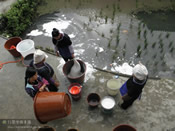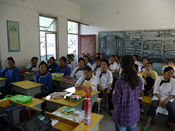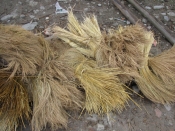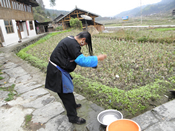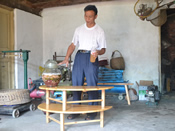Information provided by Pan Yongrong (Guizhou Programme Consultant, PCD) and Li Qing (Programme Officer for Ecological Agriculture, PCD)
Written by May Tam (Communications Officer, PCD)

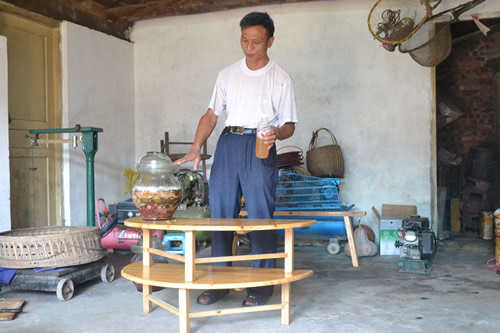 |
| Chairperson Wu makes enzymes himself for home cleaning. |
There cannot be healthy living without personal cleanliness and household hygiene. In the countryside, there are many effective traditional ways of keeping body and home clean, but perhaps making and using these traditional cleansers is more complicated and less convenient than using modern chemical products, and consequently the latter are infiltrating traditional villages on a massive scale. In Liufang Village at Liping County in Guizhou, villagers learnt of the hazards of household chemicals by accident, when fish fry that they were raising in the paddy fields were inadvertently killed by domestic detergent. Consequently, villagers renamed household chemicals 'home pesticides' to depict their danger!
Fish Fry in Paddy Fields Killed by Dish-washing Detergent
Liufang Village is inhabited by the Dong people. For nearly eight years, PCD has been supporting the villagers to revive traditional organic farming by raising ducks and fish in paddy fields. Most of the villagers know that chemical fertilisers and pesticides are harmful and have completely given up their use. However they did not realise that household insecticides and detergents are also hazardous to human beings and the environment. In January 2012, a wedding banquet was held by Mr Wu Shixian, the chairperson of the Liufang Association of Organic Agriculture (henceforth “the Association”) for his son. Village women came to help in cleaning the dishes and a lot of detergent was used. Water containing the detergent was discharged into the paddy field next to Mr Wu's house. The next day they found that large numbers of fish fry in the field had died.
Some speculated that the fish fry had died because of the detergent. They then found out that such incidents had happened on previous occasions. Other villagers had also accidentally killed fish in the fields when they used washing powder. A month later, PCD staff and members of the Association discussed what had happened. Everyone agreed that they had not attained the goal of living an 'organic' life by merely giving up the use of pesticides and chemical fertilisers in their fields. To truly lead such a life, one has to change household practices as well. The Association and PCD decided to hold a training programme for the villagers on the hazards of household chemicals so as to raise their awareness of the issue.
The programme was conducted in July 2012. It was divided into two main parts to help villagers gain in-depth knowledge of detergents and insecticides, including the ingredients in household chemicals and the hazards they pose to human beings and the environment.
Hazards of Household Chemicals
The first part of the training was on detergent used at home. Villagers learnt about the ingredients in such detergents, which include perfume, preservatives, viscosity control agents and surfactants. Ingredients in washing powder include surfactants, builders, stabilisers, dispersant, optical brighteners, perfumes and enzymes. All these chemicals are harmful to human beings and may lead to cancer, anaemia, liver injury and skin diseases. They are also dangerous to people’s reproductive system and human fetus development. Shampoos that we use nowadays often contain excessive heavy metals and carcinogens.
Detergents are also very harmful to the environment. When any detergent is poured onto the soil, the soil pH will be affected which in turn affects plant growth. When any detergent is poured into rivers or fields, it will poison the fish and affect the survival of tadpoles and frogs. When there are fewer tadpoles and frogs, the pest species that they normally eat will multiply.
The second part of the training was to learn about the modern household products for the prevention and control of mosquitoes, flies and insects, such as mosquito repellents, fly repellents and insect sprays. Most of these chemicals are actually pesticides and can lead to poisoning. They can actually be more harmful than agricultural pesticides because they are used indoors, often with doors and windows shut, while pesticides are used outdoors in fields and dissipate more easily. Household insecticides can lead to diseases of the respiratory, nervous, endocrine and reproductive systems.
In the training, the villagers (mainly women) were encouraged to revive the use of traditional methods for personal hygiene and home cleanliness and for pest prevention and control. These methods are usually healthier and more environmentally friendly. For example, water saved from washing rice, camellia seed powder, honey locust (a plant) and aloe vera juice can be used for washing hair. They are all safe and cheap. Wood ash can be used to wash dishes and lye made from ash of glutinous rice grass can be used for washing clothes and hair. Rice husk can be used for washing dishes and eating utensils.
To control mosquitoes and flies, we can simply use mosquito nets, mesh screen doors, fly traps, fly swatters and electric mosquito swatters. We can also grow plants that repel mosquitoes and flies such as nepenthes, pelargonium and pyrethrum. It is also important to remind villagers to keep the environment clean by clearing garbage promptly.
From Consciousness Raising to Behavioural Changes
The training had some impact. After it, some women revived traditional cleaning methods, such as using lye made from ash of glutinous rice grass or rice sour soup to wash their hair. They believe that these natural products are better than shampoos. The hair is smoother and less hair falls out. They are also cheap. Some villagers say they will use mosquito nets from now on to avoid the hazards arising from the use of mosquito repellents, and will also use flypaper instead of insect sprays. Some women say that rice water is the best for washing dishes, after which it can be used to feed pigs. Mr Wu Shixian, the chairperson of the Association, even made enzyme broth himself and used it for washing. The result was not bad and some other villagers are now doing the same.
Nai Jianlan, a woman villager, told us her experience of using household chemicals. She said that for a few years she worked in Guangdong Province. During that time, she wanted to have a child but failed to become pregnant. When she was back in the village, she joined in the training. After the training she stopped using mosquito repellents and other chemical cleaning agents. She is now pregnant. “No wonder I couldn't get pregnant in the few years I worked in Guangdong”, she said excitedly. “It was because I used mosquito coils every night. I stopped using them after taking part in the training. It was really effective. Now I am pregnant and I’m going to have a child!”
Villagers of Liufang Village belong to the Dong ethnic group. They are good at composing songs. After the training, the villagers composed a song to express their reflections on the subject:
Please listen everyone
I am going to sing a song about household pesticides
I will tell you about the hazards of household pesticides
Our village will be safe and healthy only after we know about the hazards
The village will be safe and healthy just like flowers blossoming in a warm spring and bringing happiness
Nowadays we use all kinds of products produced in factories
We have abandoned our traditional products
With modern products in our hands
We have no idea whether pesticides have side effects
Mosquito coils might be fragrant but they are harmful
They kill mosquitoes as well as you and me
They poison our health just like pesticides used in fields
If you keep smelling them you will feel dizzy
They are poisonous and are pungent when breathed in
We may die if we breathe them for a long time
Pesticides are harmful so do not be lured
Mosquito coils are poisonous so stop using them
Nowadays everyone uses detergents to wash dishes
Dishes are really clean when washed with detergents
Do you know not only does it charm you but also harms you
Then why do we still love it so?
You praise it for being effective in cleaning dirt but it is the chemical that works
You won’t know if it’s harmful simply by looking at it
Our bodies will be harmed if we keep using them
You will regret it when you end up in the hospital
Nowadays we use washing powder to wash clothes
Do we know what chemical ingredients there are in washing powder?
Let’s tell people from now on
Think before you use any new product
Our hair is just as dark when we use traditional products to wash our hair
With mosquito nets we can sleep till dawn
When washed with ash water, dishes are as clean as though they are new
Now let’s act and the sun shines happily above us
(Translated from Dong language into Chinese by Pan Yongrong)
In spite of this effort, household chemicals are still widely used in the village. A villager said during the training: “Modern stuff is good and convenient. Traditional stuff is too troublesome. We have no time to do it.” Some villagers thought that not all traditional methods were effective in washing clothes. Sometimes they still had to use washing powder. Training and raising consciousness may not be able to change the popular use of household chemicals, but knowing is the first step towards it. A beautiful future relies on behavioural changes brought by a new consciousness.



